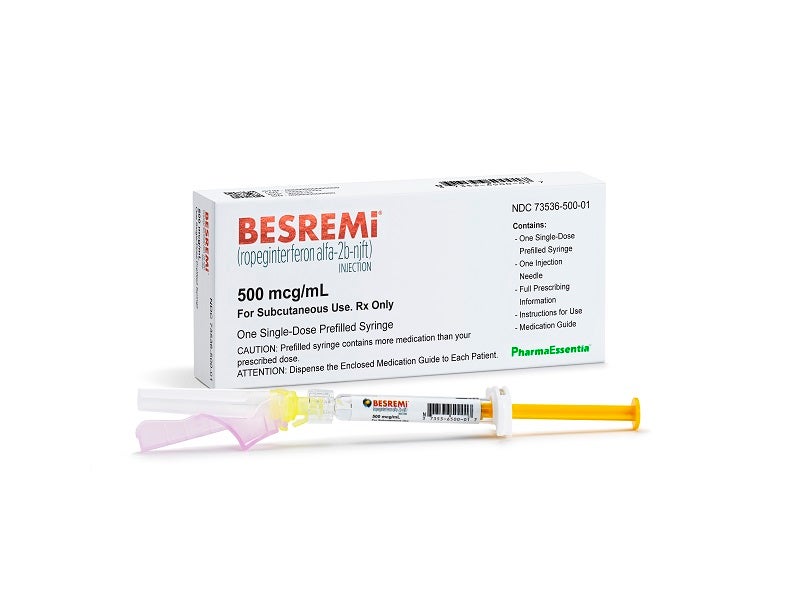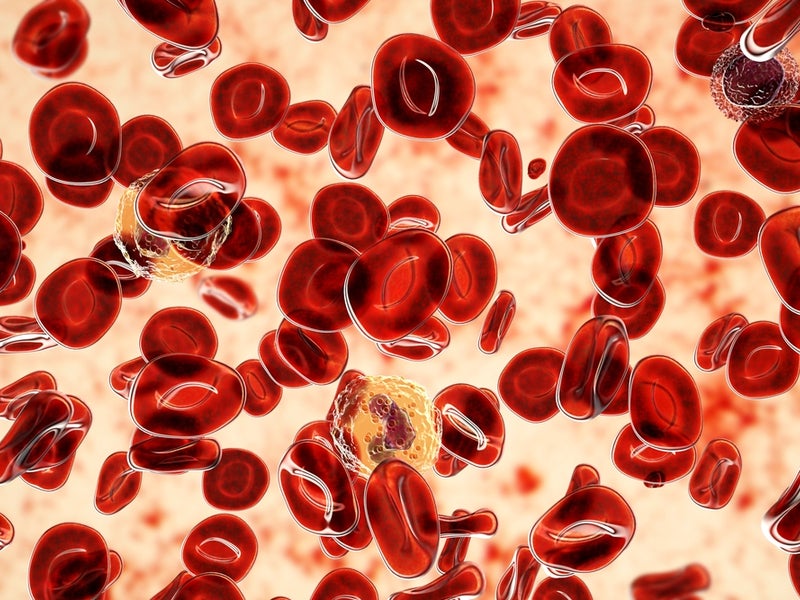BESREMi® (ropeginterferon alfa-2B) injection is a first-of-its-kind interferon therapy indicated for the treatment of polycythaemia vera (PV) in adult patients.
Developed by PharmaEssentia, BESREMi is available as a sterile, preservative-free, clear, colourless to slightly yellowish solution containing 500mcg of ropeginterferon alfa-2b-njft in a single-dose prefilled syringe for subcutaneous administration.
The drug is designed for self-administration subcutaneously once in two weeks. It is taken once monthly in the case of long-term maintenance.
Approvals for BESREMi
BESREMi received orphan medical product designation from the European Medicines Agency (EMA) in December 2011. It also received orphan drug designation in the US.
The EMA’s Committee for Medicinal Products for Human Use (CHMP) gave a positive opinion for the drug in December 2018. BESREMi was approved by the EMA as a first-line monotherapy to treat PV in adult patients without symptomatic splenomegaly in February 2019.
BESREMi was approved by the US Food and Drug Administration (FDA) for the treatment of adult patients with PV in November 2021. The drug is also approved in Switzerland, Taiwan, Israel and South Korea.
Polycythaemia vera causes and symptoms
PV is a type of rare and chronic blood cancer that originates in the bone marrow. The disease causes overproduction of blood cells in the body, which can lead to thickening of the blood, clots, stroke and heart attack.
The disease may also cause circulatory disorders, such as thrombosis and embolism, as well as other malignancies, such as leukaemia.
The underlying molecular mechanism of the disease is not understood and still under research. The disease is believed to be caused due to an impaired Janus Kinase 2 (JAK2) or tet methylcytosine dioxygenase 2 (TET2) gene, which are responsible for the normal production of blood cells in the body.
Men aged 60 years and above are at a higher risk of the disease. An estimated two out of 100,000 individuals are affected by the disease. Some common symptoms include dizziness, headache, excessive sweating, double vision, weight loss, itchy skin, enlarged spleen, dyspnoea, swelling of the joints, and angina or congestive heart failure.
BESREMi’s mechanism of action
BESREMi is a long-acting, mono-pegylated proline interferon developed using PharmaEssentia’s novel pegylation technology platform. It has exhibited improved pharmacokinetic properties in clinical studies, including increased tolerability and convenience.
The drug works by binding to the interferon alfa receptor (IFNAR), a transmembrane receptor. The binding to IFNAR triggers a chain reaction that results in the activation of the Janus kinase 1 (JAK1) and activator of transcription (STAT) signalling pathway, producing a series of anti-proliferative and immunomodulatory effects that slow the production of red blood cells in the bone marrow.
Clinical studies on BESREMi
The EMA’s approval of BESREMi was based on the positive outcomes of a clinical development programme consisting of four clinical studies, namely PROUD-PV, PEN-PV, PEGINVERA and the CONTINUATION-PV.
PROUD-PV was a Phase III, 12-month, randomised clinical study conducted to evaluate the safety and efficacy of the drug compared to hydroxyurea in PV patients who did not receive prior hydroxyurea treatment.
The primary endpoint of the trial was the Complete Hematologic Response (CHR) rate at 12 months. Ropeginterferon alfa-2b showed better CHR as well as an improved safety and tolerability profile compared to hydroxyurea in the study.
PEN-PV was a Phase III open-label and single-arm study in patients that completed the ropeginterferon alfa-2B arm of the PROUD-PV study. It was performed to evaluate the convenience of self-administration of the drug by patients using a pre-filled pen.
PEGINVERA was an open-label, prospective, multi-centre, single-arm Phase I/II dose escalation trial performed to determine the maximum tolerated dose in patients. Subjects were successfully switched from the once every two weeks to a four weeks long-term maintenance dosing schedule after a period of two years.
The study enrolled 51 PV patients who were treated with BESREMi for five years. Ropeginterferon alfa-2b demonstrated disease-modifying abilities after four years through the reduction of the mutant JAK2V617F allelic burden to below 10% in the majority of patients. The study continued for seven and a half years and achieved CHR in 61% of patients.
CONTINUATION-PV was an open-label, multi-centre, Phase IIIb clinical study conducted to determine the long-term efficacy and safety of the drug. Patients that had completed the PROUD-PV study were selected to enrol in the study.
The FDA’s approval of the drug was based on the safety outcomes from the PEGINVERA and PROUD-PV/CONTINUATION-PV clinical studies as well as the efficacy data from the PEGINVERA clinical study.
Marketing commentary on PharmaEssentia
Based in Taiwan, PharmaEssentia is a biopharmaceutical company focussed on the development of treatments for myeloproliferative neoplasms, hepatitis and other diseases.
The company granted an exclusive licence to AOP Pharma for the development and marketing of the ropeginterferon alfa-2b for PV, chronic myeloid leukaemia and other myeloproliferative neoplasms (MPN) in European, Commonwealth of Independent States (CIS) and Middle East markets in 2009.
PharmaEssentia holds the rights to the drug in the rest of the major markets, including North America, South America and Asia.





